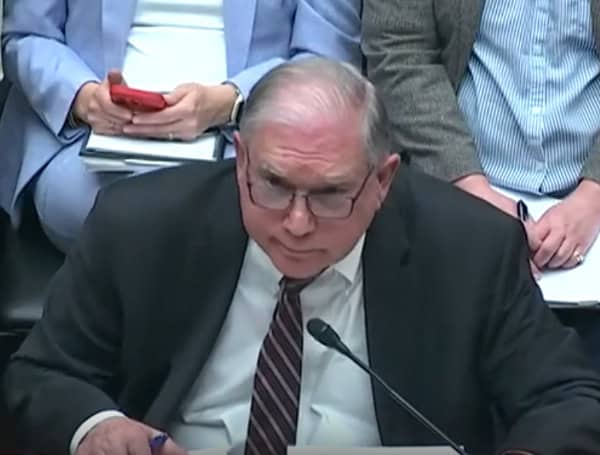The COVID-19 pandemic has been a tumultuous and controversial chapter in recent history, with the origins of the virus sparking intense debate and scrutiny.
At the heart of this controversy lies the role of the National Institutes of Health (NIH) and its alleged funding of gain-of-function research at the Wuhan Institute of Virology in China
NIH Principal Deputy Director Lawrence Tabak made a startling admission.
When questioned by Representative Debbie Lesko, Tabak acknowledged that the NIH had indeed funded gain-of-function research at the Wuhan Institute of Virology through the EcoHealth Alliance.
However, Tabak’s response highlighted the ambiguity surrounding the definition of this term, stating that “it depends on your definition of gain-of-function research.”
Read: Georgia Rep. MTG Vs. New York Rep. AOC In Heated Scuffle During GOP House Committee
This semantic dance has been a recurring theme in the ongoing discussions, with public health officials attempting to navigate the nuances of the terminology.
Tabak’s admission stood in stark contrast to the persistent denials and evasions from other high-profile figures, including former National Institute of Allergy and Infectious Diseases (NIAID) director Dr. Anthony Fauci.
Fauci has repeatedly rejected the notion that the Wuhan lab research involved gain-of-function experiments, clashing with Republicans in congressional hearings and “playing semantics” with the term. This pattern of contradictory statements has fueled the public’s frustration and undermined trust in the government’s transparency.
The NIH’s own handling of the gain-of-function definition has further muddied the waters. The agency scrubbed its website of a longstanding definition for this research practice on the same day that Tabak’s October 2021 letter to Congress was sent. This move has raised concerns about the lack of clear and consistent oversight for such potentially hazardous research, which Bryce Nickels, a professor of genetics at Rutgers University, described as “pure insanity.”
The EcoHealth Alliance, a nonprofit organization that collaborated with the Wuhan Institute of Virology, has also been a central figure in this saga. EcoHealth Alliance president Dr. Peter Daszak, in a congressional hearing, testified that his organization “never has and did not do gain-of-function research, by definition.”
However, this claim was directly contradicted by private correspondence and sworn testimony from other experts, such as Dr. Ralph Baric, a leading coronavirologist. In response, the Department of Health and Human Services (HHS) has now suspended current grants to EcoHealth Alliance and is seeking to block the organization from receiving future funding.
The controversy deepened further with revelations about the alleged actions of Dr. David Morens, a senior advisor to Dr. Fauci at the NIH. Testimony revealed that Morens, a “mentor” to EcoHealth Alliance’s Daszak, had purportedly learned “how to make emails disappear” after receiving public records requests.
Read: Watchdog Groups Ensures Fauci’s Wuhan Lab Connection And Its COVID Research Is Not Forgotten
“Dr. David Morens, a senior advisor to Fauci for decades, wrote in an email to Dr. Daszak: I learned from our FOIA lady here how to make emails disappear after I am FOIA’d, but before the search starts. So I think we are all safe. Plus I deleted most of those earlier emails after sending them to Gmail. Are those actions consistent with NIH document retention policies?” Republican House Oversight Chair James ComerComer asked.
Tabak answered that it was not.
“Does the NIH FOIA office teach employees how to avoid transparency?” Comer asked in a follow-up.
“I certainly hope not,” Tabak said.
This alleged violation of NIH document retention policies has raised concerns about the potential obstruction of the House Select Subcommittee’s investigations into the pandemic’s origins.
Another point of contention has been the persistent claim that the COVID-19 pandemic originated from a wet market in Wuhan. Nickels, the Rutgers professor, has criticized Tabak for continuing to promote this narrative, stating that “no credible scientist still believes this” and that the wet market theory has even been refuted by leading experts like Dr. Baric.
The hearings have also highlighted the broader issue of the lack of oversight for scientific research on pathogens that pose a threat to human health. Nickels has argued that it is “pure insanity to continue to delegate responsibility for risk/benefit analysis of research that poses an existential threat to humanity to the scientist that will perform the work and their institutions.” The public’s trust in the scientific community’s ability to self-regulate has been severely tested by the events surrounding the COVID-19 pandemic.
Read: Congressional Push To Ban Risky ‘Gain Of Function’ Medical Research Gains Momentum
As the investigations into the pandemic’s origins continue, the House Select Subcommittee on the Coronavirus Pandemic has scheduled a public hearing for June 3, where Dr. Fauci will be expected to answer questions about the gain-of-function research at the Wuhan lab and the various theories surrounding the virus’s origins. This highly anticipated testimony will undoubtedly shape the ongoing narrative and the public’s understanding of this complex and consequential issue.
In a significant development, the Department of Health and Human Services (HHS) has informed EcoHealth Alliance that the federal government will be suspending current grants to the nonprofit and is seeking to block it from receiving future grants. This action is based on a series of mistakes made by EcoHealth Alliance, including issues with the organization’s monitoring of work at the Wuhan Institute of Virology.
Adding to the complexity of the situation, the organization U.S. Right to Know has submitted public records requests to the NIH for emails related to the origins of the COVID-19 pandemic. The agency’s lack of compliance with these requests has led to ongoing litigation, further highlighting the challenges in achieving transparency and accountability in this matter.
Help support the Tampa Free Press by making any small donation by clicking here.
Android Users, Click To Download The Tampa Free Press App And Never Miss A Story. Follow Us On Facebook and Twitter. Sign up for our free newsletter.

